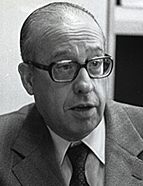

Having obtained his “doctorat d’État” [doctorate] in 1959 from the Sorbonne (where Fernand Braudel was one of the examiners), Magalhães Godinho was ready to proceed in his career as researcher at the CNRS when Adriano Moreira, head of the Instituto Superior de Estudos Ultramarinos [Higher Institute of Overseas Studies], challenged him to return to his homeland and embark upon the exhilarating mission of launching a different path for the overseas civil service. Magalhães Godinho accepted this chair, hoping that he would now be given research conditions to educate Portuguese disciples at the service of Portugal. Utter frustration. He did not sign the message of congratulations sent to Salazar at the outbreak of the colonial war. And in 1962 during the academic crisis, as a citizen he boldly urged the director of the institution (Father Silva Rego was acting as deputy for Adriano Moreira, who had been appointed Minister) to convene the council of the Institute to make an official statement on the serious events that were undermining Portuguese universities.
Clearly lending his support to students and to “University independence”, Magalhães Godinho was of the opinion that it befell the University and only the University proper to solve its problems, arguing furthermore that it was urgent to “express sharp disapproval of the way in which the Education Ministry“ had conducted itself therefore “being the only one to blame for the situations created “ and also rebuking how the Ministry “had failed the University”, saying in short the very same things other supporters of the regime, Marcello Caetano for one, were saying. Upon receipt of the letter dated 13 May 1962, Father Silva Rego finding it over-fiery, sent it to the Ministério da Educação [Ministry of Education], from where the letter was forwarded to the Ministério do Ultramar [Ministry of Overseas]. A disciplinary process was launched, culminating in his mandatory resignation and, even though he won an appeal and was readmitted, he was expelled once again and permanently. There was no room within the Portuguese University for this highly qualified scientist and citizen. Magalhães Godinho always blamed Adriano Moreira for this, saying: “It was an honour to be the only full professor to be dismissed”. Having won the appeal to the Supremo Tribunal Administrativo [Supreme Administrative Court], he was once again readmitted and once again expelled – the two decisions were published in the same issue of the Diário do Governo [Official Gazette].
It is against this background that he published A Economia dos Descobrimentos Henriquinos [The Economic Motives for Portuguese Expansion under Henry the Navigator], commissioned for the commemorations of the 5th Centenary of the death of Infante D. Henrique [Prince Henry the navigator] and which Caeiro da Matta had felt compelled to reject since, in his opinion, “it was altogether guided by a different spirit to that which had presided the commemorations in honour of Prince Henry.
